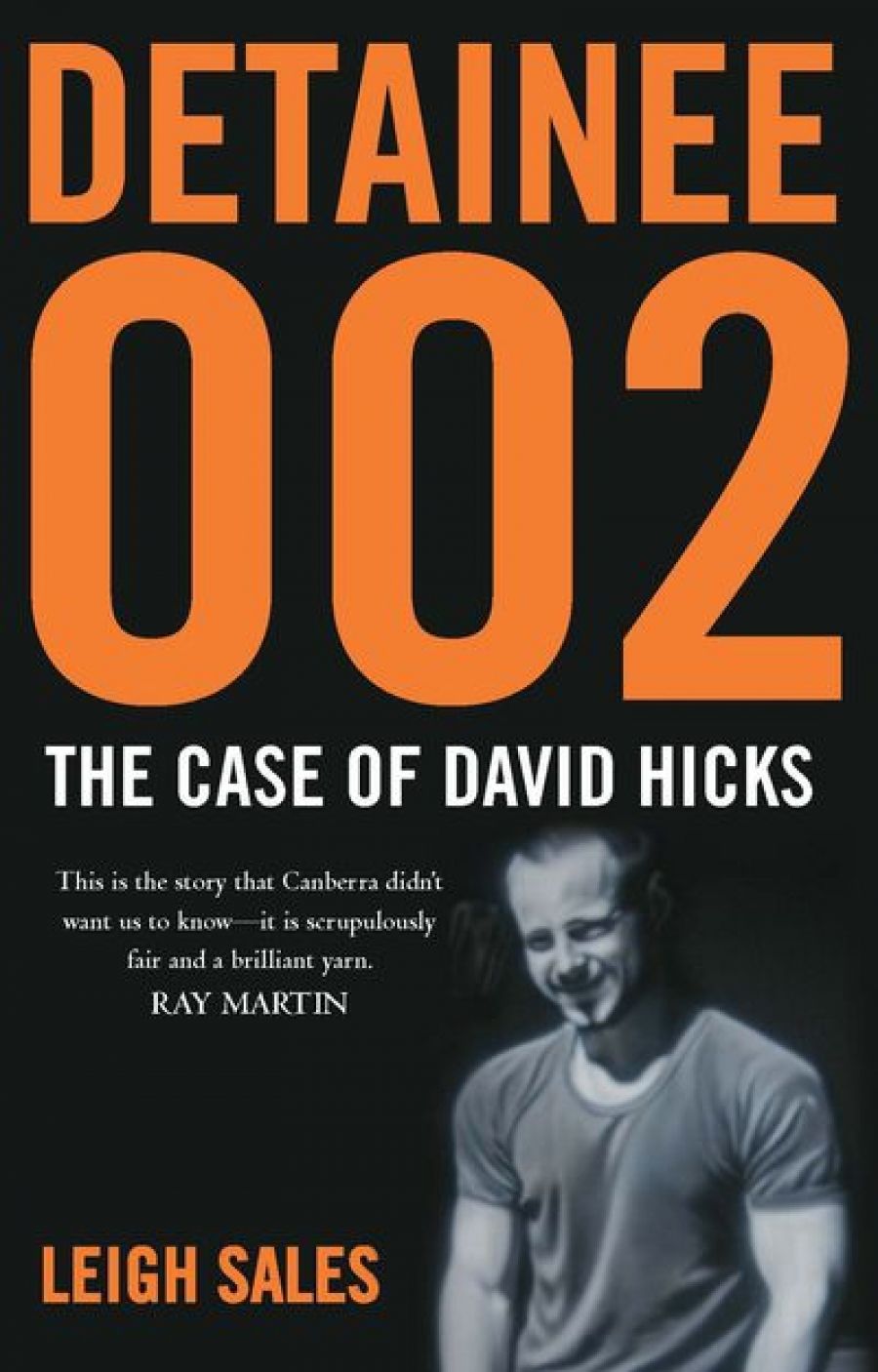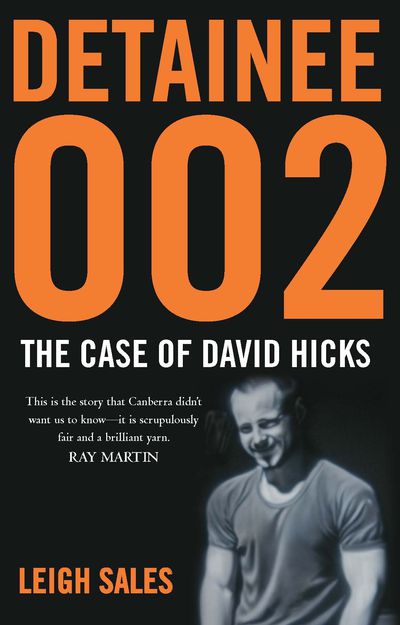
- Free Article: No
- Contents Category: Fiction
- Review Article: Yes
- Online Only: No
- Custom Highlight Text:
What is to be done with David Hicks? For more than five years, this question bubbled away in Australian political discourse, ever more so as the years passed. Today Hicks sits in a South Australian prison, serving out an abbreviated sentence for supporting terrorism. In a few months he will be a free man; well as free as his notoriety and an unforgiving government will allow. Hicks’s guilty plea and his short sentence (tax evasion can land you a heftier punishment) have taken the heat out of the affair. This is probably a good thing for Hicks, and even better for the embattled Howard government.
- Book 1 Title: Detainee 002
- Book 1 Subtitle: The case of David Hicks
- Book 1 Biblio: MUP, $32.95pb, 322pp
- Book 1 Cover Small (400 x 600):

- Book 1 Cover (800 x 1200):

So a book that attempts to place the Hicks affair in a wider political context, both local and international, is surely welcome. This is the task that Leigh Sales sets herself in Detainee 002: The Case of David Hicks. Sales is the national security correspondent with the Australian Broadcasting Commission. At about the same time that Hicks found himself in American custody, she took up the position of Washington correspondent for the ABC. Up close and personal with many of the major players, including prosecutors and defence, Sales pitches her narrative as a study of the detail and personalities of the Hicks case not the overwrought headlines.
Hicks is the exception here. Despite accounts of his misspent youth, he remains a fairly shadowy figure in Detainee 002. I get the sense that Sales is not greatly taken with the short, unprepossessing figure of David Hicks. Although she evinces sympathy for the psychological uncertainty and isolation he had to endure at Guantanamo Bay, her exasperation with Hicks the would-be freedom fighter cum terrorist is palpable. A loser looking for a cause is her summary, stripped bare. So the title of this book needs to be taken literally. It is not David Hicks who concerns Sales, but the political and legal ramifications of the Hicks affair.
I have no problem with this. The political question raised by the case of Detainee 002 are indeed pressing, and Sales does an excellent job of condensing them and getting to the nub of the matter: ‘What are the rules in this “war on terror”, and how do societies hold their governments accountable? As a nation, what rights and values – if any – is Australia prepared to trade in its fight against Islamic extremism?’ But Sales is less than self-reflective in criticising how other commentators have treated Hicks. Neither the Australian right nor the left was especially concerned with Hicks, she argues, suggesting that for both sides Hicks was a cipher for larger agendas. A fair analysis, perhaps, but the same charge may be levelled at this book. In interviews since the book’s release, Sales mused that ‘strangely enough, I have to say I feel a total absence of interest in Hicks himself’. Frankly, it shows.
While Sales sticks to the political terrain, even here she chooses her territory carefully. In her view, the Hicks case, and the man himself, became captive to a deep political and cultural rift in contemporary Australia. Right-wing commentators viewed Hicks as a dangerous terrorist, while the left cast him as an innocent abroad. Shadowing these caricatures are fundamental and unbridgeable differences about how to proceed in the ‘war on terror’. The right wants to scale back individual liberties to protect national security; the left wants to protect hard-won political and legal rights. Each side treats the other with derision and contempt. The right views the left as ill-informed, naïve and out of touch with the new dictates of the twenty-first century. (This is putting their complaints politely. ‘Lunatic’ and ‘hysterical’ is how right-winger Janet Albrechtsen describes some civil libertarians and their fellow travellers.) Meanwhile, the left worries about an uncontested descent into authoritarianism.
Into this mêlée of insult and hyperbole comes Leigh Sales. She wants to reclaim moderation in the debate over national security. Debate has become so polarised, she contests, that moderate, evidence-based opinion has been squashed. ‘Guantanamo has become a political lightning rod for Bush,’ she writes, ‘as Hicks became for Howard.’ Sales cites the level of vitriol sparked by the Hicks affair as evidence that ‘almost none of the contributors held a middleground position’. In her own analysis, Sales attempts to sweep aside the emotionalism of the Hicks affair by posing a hardheaded and pragmatic question: has Guantanamo Bay and the handling of David Hicks made the world safer from terrorism and delivered swift justice to a terrorist? By the conclusion, her answer is a resounding no.
If this is the only moderate position available in the debate on terrorism and security, then I am a tad worried. Sales has a point when she argues that debate has been polarised, but she both overstates and under-theorises this polarisation. True enough, matters are sometimes more complex and nuanced than either side gave credit. Sales is at her best, when digging away at the details. She discovers Australian diplomats concerned and anxious at the delays that beset the Hick case: American military prosecutors search their souls and express vigorous doubts about the fairness of the proposed trials. The left’s image of a monolithic America bearing down on dissent is challenged by Sales as she trips the corridors of the State Department and the Pentagon, her off-the-record interviews revealing far more disquiet and qualification than might be imagined.
For all this valuable grunt work, Sales does not seriously disrupt the so-called left-wing critique of the ‘war on terror’. Her evidence acknowledges the existence of a powerful , war party clustered around Vice-President Cheney and former Secretary of Defence Rumsfeld, hell-bent on extending the powers of the executive and willing to play on the dark side in the fight against terrorism. It is nice to know that President Bush gave Republican moderates a hearing, but that doesn’t change the fact that he backed the Cheney-Rumsfeld strategy, and oversaw the marginalisation of men such as Colin Powell and Richard Armitage. Likewise, it is gratifying to read that some Australian public servants ‘worked tirelessly to improve the legal process’ that Hicks faced, but the Howard government still emerges frequently as supine in its dealings with the Bush administration.
Again, Sales’s own material backs this up. The Blair government – no shirkers in the ‘war on terror’ – formed a critical position on Guantanamo Bay and the military commissions set up to try prisoners because, ‘[f]rom the first day, British officials spoke of the need for due process and the protection of human rights’. The Howard government closed this avenue off because of its eagerness to waltz with Washington, as Sales pithily describes it. In fact, despite herself, Sales marshals some evidence that looks suspiciously close to current left-wing critique.
And yet I don’t think it is necessarily intemperate to bridle at Australia’s uncritical support of the Bush administration’s ‘war on terror’, nor to defend passionately the rule of law. Saks lists a clutch of public figures who have voiced unease, here and overseas: Ninian Stephen, Mary Gaudron, Lord Goldsmith, Malcolm Fraser and Colin Powell, who recently declared that he would close Guantanamo Bay immediately if he could. These people are moderates cast adrift by the sharply right-wing conduct of the ‘war on terror’.
Like lobsters, we’ve been boiled slowly by nominally conservative governments that are far from conservative. Their pursuit of the ‘war on terror’, egged on by a screeching right-wing commentariat, has entailed radical breaks with established civil practice. You don’t have to be a leftist to worry where this might lead.


Comments powered by CComment